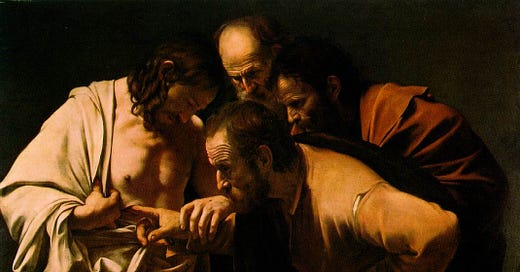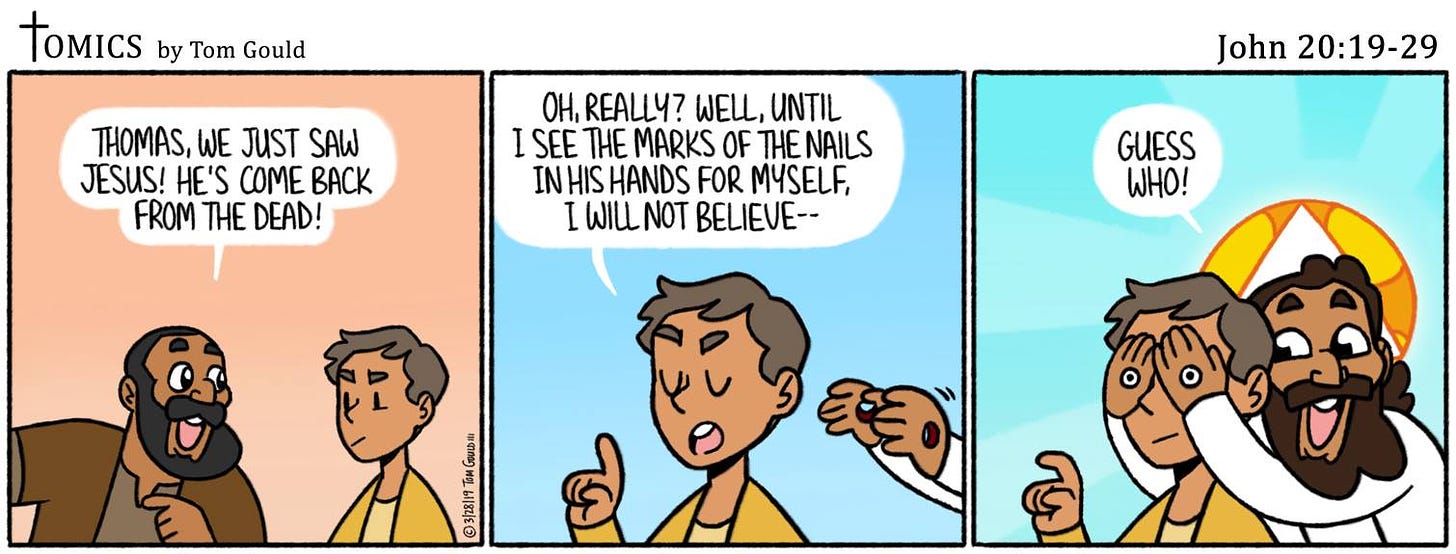Today is the Feast of St. Thomas the Apostle, and if you’re wondering, no, the Church did not “suppress” the “gospel” of Thomas. It’s a historical curiosity, but also obviously fake.
The real Gospel reading today is the most famous story about Thomas—doubting his fellow apostles after the resurrection.
Reading 1
Eph 2:19-22
Brothers and sisters: You are no longer strangers and sojourners, but you are fellow citizens with the holy ones and members of the household of God, built upon the foundation of the Apostles and prophets, with Christ Jesus himself as the capstone. Through him the whole structure is held together and grows into a temple sacred in the Lord; in him you also are being built together into a dwelling place of God in the Spirit.
These are the closing lines of a longer passage where Paul tells the gentiles that, although they weren’t expecting a Messiah, one has come, and He’s here for us as well as the Jews.
We are now members of the household of God, which was built by Apostles like Thomas.
Responsorial Psalm
Ps 117:1bc, 2
R. Go out to all the world and tell the Good News.
Praise the LORD, all you nations;
glorify him, all you peoples!
R. Go out to all the world and tell the Good News.
For steadfast is his kindness for us,
and the fidelity of the LORD endures forever.
R. Go out to all the world and tell the Good News.
St. Thomas took this Psalm to heart. Despite his reputation as a “doubter,” he travelled farther than any other apostle, leaving the Roman empire behind, reaching India and possibly even China.
He helped build up God’s temple, but he also knew that the whole structure is held together by Jesus. He established churches in India, before (probably) returning to the west. These Christians were, unfortunately, cut off from the rest of the Church as Rome fell and later Muslim empires conquered the Middle East.
Imagine the surprise of Portuguese explorers in the 15th century arriving in India and finding the Gospel had beaten them there by nearly a millennium and a half! It was their strong faith in Jesus that kept these “St. Thomas Christians,” or “Syrian Christians of India,” going in isolation.
Alleluia
Jn 20:29
R. Alleluia, alleluia.
You believe in me, Thomas, because you have seen me, says the Lord;
blessed are those who have not seen, but still believe!
R. Alleluia, alleluia.
We all ask to see miracles, but we’re most blessed if we don’t need to see them.
Gospel
Jn 20:24-29
Thomas, called Didymus, one of the Twelve, was not with them when Jesus came. So the other disciples said to him, "We have seen the Lord."
But Thomas said to them, "Unless I see the mark of the nails in his hands and put my finger into the nailmarks and put my hand into his side, I will not believe."
Now a week later his disciples were again inside and Thomas was with them. Jesus came, although the doors were locked, and stood in their midst and said, "Peace be with you."
Then he said to Thomas, "Put your finger here and see my hands, and bring your hand and put it into my side, and do not be unbelieving, but believe."
Thomas answered and said to him, "My Lord and my God!"
Jesus said to him, "Have you come to believe because you have seen me? Blessed are those who have not seen and have believed."
It’s unfortunate that this is the story we get on Thomas’s feast. Thomas comes across much better in the 11th chapter of John. Jesus learns that his good friend Lazarus is dead. When Jesus says they ought to go back to Judea, the disciples say they’ll be stoned if they go. Jesus decides to go, anyway.
What does Thomas say? “Let us also go to die with him.”
That took guts. It’s almost not surprising that someone can go from that kind of confidence, to being completely shattered when his Rabbi is publicly executed. But it probably took even more guts to admit he was wrong.
And boy, was he wrong. So he spent the rest of his life making up for it, going out to all the world and telling the Good News.




